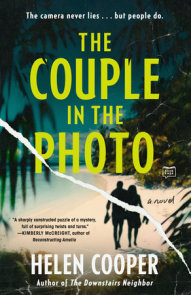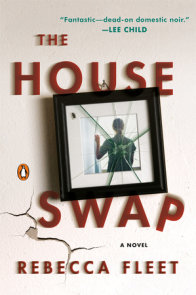READERS GUIDE
A Conversation with Kia Abdullah1. What inspired you to write this story?
I can trace the idea to something that happened when I was eight years old. During the World Cup, I drew a picture of the England flag—a red cross on a white background—and stuck it in our window to support our national team. When my dad came home that evening, he tore down the flag in a panic. “Don’t ever do that again,” he told me. “We’ll get a brick through our window.”
I was too young to understand that my father—a Bangladeshi immigrant to England—saw violence in that flag, long used as an emblem by far-right groups in Britain. That memory came to me years later when I left multicultural London for a small rural town in Yorkshire. One morning, a neighbor posted a flag through my letterbox with an invitation to a sing-along to celebrate the anniversary of Victory in Europe Day. I wondered what would happen if I declined. We live in a time where symbols, colors, and slogans mark out volatile battle lines. What happens when that battle comes to your doorstep? That’s the question I wanted to explore.
2. What was it like alternating scenes between such different perspectives?
For me, writing from different perspectives is one of the most interesting parts of the process. I once came across a thought experiment that asked, “Are you right about everything?” Of course, my answer was no. It then asked, “What are you wrong about?” That second question stopped me in my tracks, because I had never properly considered which of my views and beliefs were objectively wrong.
My novels and the different perspectives in them seek to emulate that experiment. By putting the reader in the minds of different characters, I’m trying to get them to see the world from another point of view.
3. This is your fourth novel. How did writing it differ from the experience of writing your other novels?
In many ways, this was my most difficult novel. I wrote it in the deep pandemic, which was hard because so much of my creative energy comes from being out in the world. I thrive on meeting new people and seeing new places, so writing an entire novel while largely stuck at home was extremely challenging.
On the plus side, I am now confident that I know how to finish a novel even if I’m struggling. The author David Nicholls once said that it doesn’t get easier with each book. He’s right, but I now know that I can get to the end. That always offers solace when the writing gets hard.
4. Much of the dialogue in Perfectly Nice Neighbors is so subtly, realistically tense. Was any of it based on interactions you’ve had in real life?
Some of the subtler conversations were based on real life. One example: In 2018, my husband and I were considering a move to a tiny village in the English countryside. We fell in love with a particular stone cottage, and as we left after our first viewing, our would-be neighbor—a gray-haired gentleman—came over and asked where I was from. When I said London, he waved impatiently and said, “You know what I mean.”
I smiled politely and told him that my family was from Bangladesh, but that I had been born and raised in London. As we talked, a dog bounded up to him. “Her name is Lola,” he told me, bending down to pet her. Then, completely deadpan, he added, “She was a showgirl.”
I laughed and he nodded in approval. It seemed that by recognizing the words to the famous Barry Manilow song, I had proven something to him: I was not a peculiarity of which to be suspicious, but someone who had a chance of fitting in. I used that in Tom’s first conversation with Salma because it’s such a subtle form of othering.
5. Which was your favorite scene to write, and why?
I enjoyed writing the barbecue scene that opens the novel. There’s so much that goes on, from Tom assuming that Salma lives in social housing to Willa being intentionally crude. The underlying tension of the scene was great fun to write.
It’s interesting because one reviewer in a UK magazine said that Salma is “on the lookout for reasons to take offense,” while others have understood why Salma is uncomfortable. I love that two different readers can interpret this dynamic in different ways. It speaks to the complexity of the subject and, hopefully, the nuance in the scene.
6. Without any spoilers, which was the most painful scene to write?
From a technical point of view, the scene that reveals what actually happened to Zain was difficult to write. I had to pack in a lot of information while never letting the tension drop. I had to build the scene in layers. First, the reader is meant to think that they know the truth. Then comes the “oh my god” moment when the actual truth is revealed. As a reader, I just love it when an author lands that moment with skill. It’s almost like a punch in the gut, and that’s what I was aiming to do.
From an emotional point of view, the court scene where Jamie talks about his friend David Adeleye was painful. Many children of color, particularly Black children, have to behave in adult ways from a young age. I remember an anecdote from Between the World and Me in which the author, Ta-Nehisi Coates, visits a preschool with his son. As soon as they arrive, his son tears away to leap and laugh with the other children, and Coates feels this instinctive need to tell him to calm down. Coates realizes that he’s expecting a four-year-old child to be watchful, prudent, and shrewd, and I found that heartbreaking. This scene hopefully captures some of that same poignancy.
7. What does being a good neighbor mean to you?
I’m lucky to have very good neighbors. They bring in my recycling bin when they’re retrieving theirs, they keep an eye on my house when I’m away, and they gift us pears from their tree. These small kindnesses make a difference.
Being considerate goes a long way. When my husband and I were planning a party in our new home, we dropped a card in our neighbors’ letterbox saying, “We are celebrating Kia’s fortieth birthday tonight with some friends, so you may hear some music/noise coming from our house until about midnight. We apologize in advance. The good news is it won’t happen again for about two years until Peter turns forty in 2024!”
When we later got to know them, they said they were so pleased when they read the card, because it meant that we were considerate. It gave them peace of mind.
8. If you could give Salma any advice at the end of this book, without any spoilers, what would it be?
I would tell her not to forget who she is. She’s tough, yes, but she’s also tolerant and compassionate. We see that in the scenes at school and the ways in which she helps her pupils. Those qualities are important, and I hope that she finds a way to keep them.
9. If you were to cast Salma and Bilal as actors in a movie, who would you choose? How about Tom, Willa, Zain, or Jamie?
I love this game. Archie Panjabi from The Good Wife would make an excellent Salma. I think Rahul Kohli from The Haunting of Bly Manor and Midnight Mass would be great as Bil. He’s a bit younger than Bil is in the novel, but he can dye his beard gray!
Channing Tatum has the right sort of look for Tom, while Anya Taylor-Joy is perfect for Willa. The boys are a bit harder. Perhaps I’ll leave that to a future casting director to decide!
10. What do you most want readers to take away from Perfectly Nice Neighbors?
My hope is that readers will finish the last page and immediately want to talk to someone about it. There are lots of questions that the novel raises, but I don’t seek to answer them. I want the reader to answer for themselves. One small example: When Linda, the hostess of a neighborhood barbecue, thanks Salma for “indulging” them with the potato salad and tells her that she can bring something with “a bit more zing” next time, is she being ignorant, or is it a genuine bid for connection? Different readers will interpret this in different ways. Through these scenarios, I want the reader to consider their own perspective but also the opposite view.
Discussion Questions
1. Have you ever had a bad neighbor? Have you ever been a bad neighbor? If yes to either question, what did you learn from the experience?
2. If you were in Salma’s position, seeing your window painted over, what would you have done?
3. What traits or values would someone need to have to be part of your “tribe,” as Salma defines it in Chapter 1?
4. How did your sympathies change through the novel? Was there a moment when you weren’t sure who to sympathize with? Why?
5. Which moment of escalation surprised you the most? How might you have handled it, if you’d been involved?
6. How do you think the physical proximity of Salma’s and Tom’s houses, with their balconies and shared fence, affects their relationship? How might this novel have turned out differently if the houses were a little farther apart?
7. Which scene in the novel made you most tense? How were you hoping for the scene to resolve, and how did you feel about the way it actually resolved?
8. What was your favorite scene in the novel, and why?
9. Why do you think Tom and Willa are drawn to each other? How about Salma and Bilal?
10. Were you surprised by the ending?






















